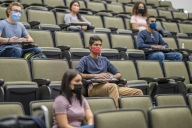You have /5 articles left.
Sign up for a free account or log in.

The Daily Princetonian (http://bit.ly/Ie2ypC)
Facing a rare instance of simultaneous and growing meningococcal disease outbreaks on campuses - on opposite coasts, no less - college administrators are taking what may be unprecedented vaccination steps, issuing precautions and hoping this unusual situation doesn’t get much worse.
The meningococcal vaccines licensed in the U.S. do not fully protect against the potentially lethal serogroup B strain that’s infected nearly a dozen people on three campuses. But the unusual size and length of the outbreak at Princeton University, which confirmed its eighth case since March on Friday, has prompted federal approval to distribute a vaccine there called Bexsero that is imported from Europe.
“This is highly unusual – I’m not sure completely unprecedented,” Centers for Disease Control and Prevention doctor Amanda Cohn said in a call with reporters Monday. “We needed to do something to prevent additional cases.”
The CDC will recommend that all Princeton undergraduates, graduate students who live in the dorms, and any individuals with functional and anatomic asplenia (including sickle cell disease) or late complement component deficiencies receive the vaccine. (Students need not cancel travel plans for the Thanksgiving holiday, Cohn said, but should remain alert for potential symptoms while at home.)
The CDC is getting final approval now, and the vaccine should be available early next month to people who meet the above criteria. Cohn said she couldn’t recall a campus outbreak among non-undergraduates.
“We want to target the vaccination campaigns to the people who are at the highest risk,” she said. “We have to balance the risks-benefits of using an unlicensed vaccine product.”
Princeton’s use of the vaccine is an encouraging but not entirely satisfying development for Andy Marso, a Topeka-based journalist who lost his toes and fingers after being infected with meningitis serogroup B in spring 2004 while studying at the University of Kansas.
“If the drug is safe enough for Princeton, it is safe enough for the general population and Americans should be able to make their own decisions about whether the risk of death, brain damage and limb loss outweighs the cost and inconvenience of getting the shot,” Marso, who has spoken and written about the issue, said in an email to Inside Higher Ed. “I think college students should advocate especially loudly for the right to make that choice because they are an at-risk population. Without vaccination it is only a matter of time before we see another Princeton. In fact, we may be seeing the beginning of another outbreak already at UCSB.”
The University of California at Santa Barbara has distributed antibiotics to 500 students who had contact with the three who were infected. A spokesman said 330 more have come in for vaccination and Santa Barbara may seek the strain B vaccine Princeton will use, depending on how things unfold on both campuses.
Tips from campus officials
You must be in close personal contact with an infected person’s secretions – within three feet for eight hours or more at a time – to be infected.
To help prevent infection, avoid sharing eating utensils, cups, water bottles or other items contaminated by the saliva or respiratory secretions of others. Cover mouth and nose when coughing or sneezing, clean hands frequently with soap and water or an alcohol-based hand rub, and stay home when sick and avoid other people who are ill.
Symptoms that could indicate a meningitis infection: Rapid onset fever, severe headache, severe neck stiffness, nausea, vomiting, increased sensitivity to light, confusion, exhaustion, rash
“Each outbreak situation is unique and requires rigorous assessment,” Cohn said. “As cases continue to occur, we’ll determine the best course of action.”
Lynn Bozof, president of the National Meningitis Association, said she fully supports use of the unlicensed vaccine at Princeton. But she trusts CDC will call for additional action if necessary.
“I don’t want to overstep what is being done because I think it’s just an unprecedented collaboration,” Bozof said. “The main thing you want to avoid is panic.”
College students are at heightened risk for the disease primarily because they live and eat in close quarters, but also because their immune systems may be weakened by poor diet, stress and lack of sleep.
But at Monmouth University in New Jersey, at least one administrator who was infected is “gravely ill,” President Paul R. Brown said in a letter to campus.
In an email sent to American College Health Association member campuses Thursday morning, before reports came out of Monmouth and Santa Barbara, ACHA’s Vaccine-Preventable Advisory Committee said that “no spread beyond the Princeton campus has occurred or is expected.”
The CDC believe the cases are unrelated.
Even if no cases have been identified locally, the committee said, campus officials should educate students and parents about meningitis and vaccines, good hygiene measures and early signs of the disease. Students who were first vaccinated before age 16 should receive a booster dose. Many colleges are telling students how to get vaccinated at campus health centers or elsewhere.
“It concerns college health officials because they are wondering if their campuses are at risk,” Susan Even, chair of the ACHA advisory committee, said in an email. “It is reassuring that there is no expectation of spread from Princeton, and good that the special efforts of CDC and FDA have helped in making Bexsero available.”
Like Monmouth, Santa Barbara and Princeton officials emailed students, staff and parents with health resources and tips on avoiding infection. Santa Barbara’s medical director participated in a press conference about the issue. On Wednesday night, Princeton hosted a “dinner discussion” on the meningitis outbreak with a university lecturer who researches vaccines and infectious disease.
Even said she didn’t know when the last campus meningitis outbreak occurred (Cohn said there are usually a couple each year), but any time one does it calls for rapid treatment of the infected individuals and anyone with whom they’ve had close contact.
“Which could be a large number, depending on the activities of the students,” she said. “Death or digit or limb loss are possible, even with treatment.” (Some recent cases have been “very serious,” Cohn said, but none fatal.)
One of the activities that could work against treatment is tailgating. Among the warnings sent out by Princeton officials was a mid-month email preceding the Princeton-Yale University football game.
“Drinking may put students at increased risk for spreading the bacteria that causes meningitis,” the email says. “The more you drink, the more your judgment may decrease about sharing objects that come into contact with the mouth, thereby increasing your risk of disease…. Please have fun, but play it safe this weekend!”
Meningococcal outbreaks are rare and have been steadily declining since the late 1990s thanks to widespread use of the quadrivalent meningococcal vaccine in students entering college, the ACHA advisory says. Today, Even said, “a large number of campuses” require students to receive a meningococcal vaccine before starting college or registering for their second term. (“Very few” people at Princeton are not vaccinated, Cohn said.)
Despite the outbreaks, the CDC has not seen an increase in the number of serogroup B cases this year. In 2012, there were about 500 reported cases, 160 of which were strain B.
As to how the Princeton outbreak originated, Cohn said, “we have no idea…. It’s always difficult to understand how outbreaks happen.”








